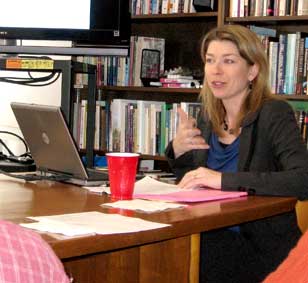Fall Healthcare Ethics Seminars spark discussion
The Healthcare Ethics Seminar meets monthly at the Poynter Center during the academic year, providing an opportunity for discussion among people who work in healthcare, faculty and students at IU, and members of the public.
On Sept. 16, Eric Meslin spoke on the topic, "Research Ethics in the Era of Personalized Medicine: Updating Science's Contract with Society." Meslin is the founding director of the Indiana University Center for Bioethics; associate dean for bioethics in the IU School of Medicine; and professor of medicine, medical and molecular genetics, public health, and philosophy.
Meslin discussed the historic importance of precaution and protection for research subjects but noted recent changes, including the development of bio-banks of tissue and other medical materials and the possibilities of personalized medicine, where treatments are tailored for the individual.
At the normative level, Meslin proposed a revision of current ideas in research practice and research ethics. Seeking to situate research within the framework of social contract theory in which we exchange some liberties for other benefits, he proposed viewing the research enterprise as a concordat between science and society. With that in mind, he invoked the norm of intergenerational justice between science and society, where each gives something in exchange. One practical implication of this idea is that we, today, acknowledge that we are beneficiaries of previous research and that we owe it to future generations to contribute to their betterment much as past generations have contributed to ours. That norm, arguably, may allow for more permissions in research ethics than is currently the case.

Susan Hickman
Susan Hickman spoke Oct. 21 on "Strategies for Communicating Treatment Preferences Near the End of Life." Hickman is an associate professor in the IU School of Nursing and a senior affiliate faculty with the Fairbanks Center for Medical Ethics in Indianapolis.
Hickman presented data from a recently completed multi-state study of Physician Orders for Life-Sustaining Treatment Program (POLST). The aim of POLST is to improve communication between patients and physicians by providing a formal mechanism, not unlike an informed consent form, that enables patients to specify the kinds and levels of treatment they prefer in end-of-life care. For example, preferences for levels of Cardiopulmonary Resuscitation (CPR) are distinguished from preferences for the administration of antibiotics, which are distinguished from preferences regarding the administration of artificial nutrition. Hickman noted that POLST has been adopted in several states but not in Indiana, although there are some preliminary discussions about the possibility.
